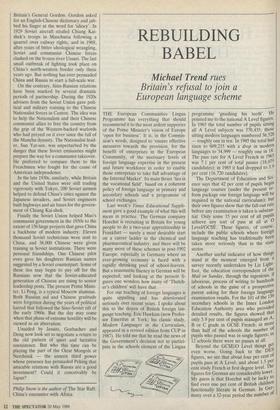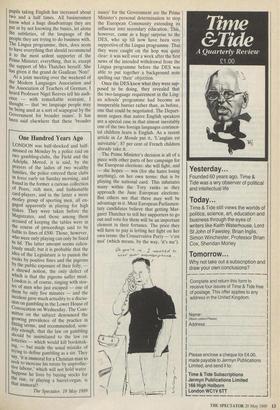REBUILDING BABEL
Michael Trend rues
Britain's refusal to join a European language scheme
THE European Communities Lingua Programme has everything that should recommend it to the most ardent supporter of the Prime Minister's vision of Europe 'open for business'. It is, in the Commis- sion's words, designed to 'ensure effective measures towards the provision, for the benefit of enterprises in the European Community, of the necessary levels of foreign language expertise in the present and future workforce in order to enable those enterprises to take full advantage of the Internal Market'. Its main thrust 'lies in the vocational field', based on a coherent policy of foreign language in primary and secondary schools and a programme of school exchanges.
Last week's Times Educational Supple- ment gave a good example of what this will mean in practice. The German company Hoechst is recruiting in Britain for young people to do a two-year apprenticeship in Frankfurt — surely a most desirable start on a career ladder in the chemical and pharmaceutical industry; and there will be many more of these schemes in post-1992 Europe, especially in Germany where an ever-growing economy is faced with a rapidly shrinking pool of school-leavers. But a reasonable fluency in German will be expected; and looking at the present fi- gures one wonders how many of 'Thatch- er's children' will have that.
For our teaching of foreign languages is quite appalling and has deteriorated seriously over recent years. I spoke about this to the doyen of British foreign lan- guage teaching, Eric Hawkins (now Profes- sor Emeritus at York; his classic study, Modern Languages in the Curriculum, appeared in a revised edition from CUP in 1987). He told me that he read the news of the Government's decision not to partici- pate in the schools element of the Lingua programme 'gnashing his teeth'. He pointed me to the national A Level figures. In 1965 the total number of pupils sitting all A Level subjects was 370,435; those sitting modern languages numbered 36,528 — roughly one in ten. In 1985 the total had risen to 609,215 with a drop in modern languages to 34,999 — roughly one in 18. The pass rate for A Level French in 1965 was 7.1 per cent of total passes (18,075 candidates); in 1985 it had dropped to 3.9 per cent (16,720 candidates). The Department of Education and Sci- ence says that 42 per cent of pupils begin language courses (under the present re- form package one foreign language will be required in the national curriculum); but their own figures show that the fall-out rate before any examination is taken is substan- tial. Only some 15 per cent of all pupils achieve any sort of pass at all at 0 Level/GCSE. These figures, of course, include the public schools where foreign language teaching has traditionally been taken more seriously than in the state sector.
Another useful indicator of how things stand at the moment emerged from a survey recently undertaken by Liz Light- foot, the education correspondent of the Mail on Sunday, through the ingenious, if laborious, process of writing to hundreds of schools in the guise of a prospective parent asking for their foreign language examination results. For the 101 of the 139 secondary schools in the Inner London Education Authority area who provided detailed results, the figures showed that only 5.9 per cent of pupils managed an A, B or C grade in GCSE French; in more than half of the schools the number of pupils who passed was in single figures; in 12 schools there were no passes at all. Beyond the GCSE/0 Level things get even worse. Going back to the DES figures, we see that about four per cent of pupils pass at A Level; and about 1.5 Per cent study French at first degree level. The figures for German are considerably lower. My guess is that Hoechst will be lucky to find even one per cent of British children functionally literate in German. In Ger- many over a 12-year period the number of pupils taking English has increased about two and a half times. All businessmen know what a huge disadvantage they are put at by not knowing the basics, let alone the subtleties, of the language of the people they are trying to do business with. The Lingua programme, then, does seem to have everything that should recommend 11 .to the most ardent supporter of the Prime Minister; everything, that is, except the support of Mrs Thatcher herself. She has given it the grand de Gaullean 'Non!'
At a joint meeting over the weekend of the Modern Languages Association and the Association of Teachers of German, I heard Professor Nigel Reeves tell his audi- ence — with remarkable restraint, I thought — that 'we language people may be being used as a sort of scapegoat by the Government for broader issues'. It has been said elsewhere that these 'broader issues' for the Government are the Prime Minister's personal determination to stop the European Community extending its influence into secondary education. This, however, came as a huge surprise to the DES, who up till now have been very supportive of the Lingua programme. That they were caught on the hop was quite clear: it was well over a week after the first news of the intended withdrawal from the Lingua programme before the DES was able to put together a background note spelling out 'their' objection.
Once the DES knew what they were sup- posed to be doing, they revealed that the two-language requirement in the Ling- ua schools' programme had become an insuperable barrier rather than, as before, one that could be negotiated. The Depart- ment argues that native English speakers are a special case in that almost inevitably one of the two foreign languages continen- tal children learn is English. As a recent article in Le Monde put it, l'anglais est inevitable'; 87 per cent of French children already take it.
The Prime Minister's decision is all of a piece with other parts of her campaign for the European elections: she will fight, and — she hopes — win (for she hates losing anything), on her own terms: that is by playing the national card. This infuriates many within the Tory ranks as they approach the June European elections: But others see that there may well be advantage in it. Most European Parliamen- tary candidates believe that getting Mar- garet Thatcher to tell her supporters to go out and vote for them will be an important element in their fortunes. The price they will have to pay is letting her fight on her own terms: the Conservative Party — 'c'est moi' (which means, by the way, 'it's me').



































































 Previous page
Previous page